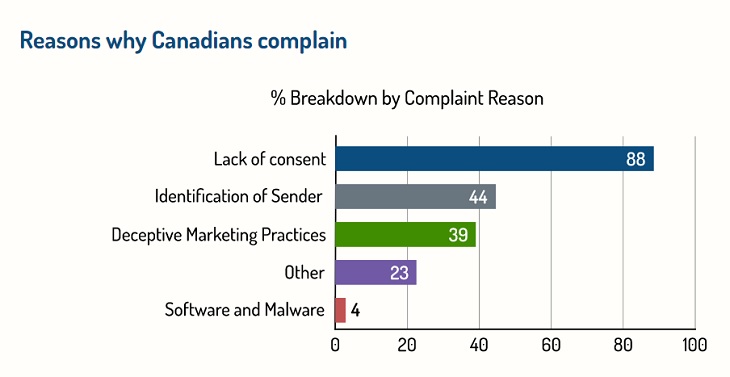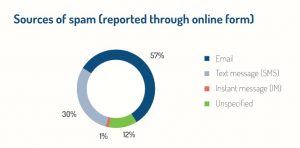
GATINEAU — ISED Canada’s Spam Reporting Centre (SRC) received more than 154,406 complaints from April 1 to Sept. 30, 2021, or an average of 5,939 per week, according to the CRTC’s most recent snapshot of its actions to enforce Canada’s Anti-Spam Legislation (CASL).
The enforcement measures the CRTC took during this time period include 253 notices to produce and 16 preservation demands. No monetary penalties were issued during this six-month period.
Since CASL came into force in 2014, the CRTC’s enforcement efforts have resulted in payments of more than $1.4 million, including approximately $805,000 in administrative monetary penalties and $668,000 from negotiated undertakings.

According to the CRTC’s report, released today, Canadians who used the SRC’s online complaint form reported various sources of spam, including email (57%), text message (30%) and instant message (1%). A further 12% did not specify the source of the spam.
When asked why they were complaining to the SRC, 88% of Canadians said lack of consent was the reason for their complaint. Other complaint reasons included the identification of the spam sender (44%), deceptive marketing practices (39%), software and malware (4%), and other reasons (23%). People who complained to the SRC were able to select more than one category of complaint reason.
Looking at complaints submitted to the SRC over the last six months, complaints about consent issues were at their highest during the month of September, according to the report.
The report also says 71% of the spam messages reported to the SRC between April and September “were related to affiliate marketing or legitimate businesses selling or promoting the sale of a good or service.”
The top five categories of affiliate marketing messages reported to the SRC related to: food, drug and health; online shopping; financial; dating; and leisure and gambling. The top five categories of commercial spam messages related to: education, training and employment; business to business; online shopping; financial; and leisure and gambling.
In its report, the CRTC highlighted some of its activities related to “the development of a network-level blocking framework to limit botnet traffic and strengthen Canadians’ online safety.” The CRTC launched a consultation in January on its proposed framework, which was met by divided opinions among Canada’s big telecoms, as Cartt.ca reported here.
The CRTC received over 40 submissions to the consultation between April and August “from a variety of parties including Canadian citizens, the telecommunications industry, academics, and some Government of Canada departments and agencies with Cyber Security mandates,” reads the CRTC’s CASL enforcement report.
The report also notes some of the CRTC’s outreach activities in the last six months, including the CRTC Compliance and Enforcement team’s participation “in four virtual engagement activities with companies, associations and organizations to raise awareness about the application of CASL to unsolicited communications.”
In addition, at the end of May, the CRTC added three new educational videos to its YouTube playlist, under the banner Spam and Telemarketing – A recipe for success, intended to provide small business owners with “clear tips on how to comply with Canada’s marketing rules, including Canada’s Anti-Spam Legislation and the Unsolicited Telecommunications Rules.”
The CRTC also says it is collaborating with international partners, including being a part of the Unsolicited Communications Enforcement Network (UCENet), where members from more than 26 countries “work together to promote international spam enforcement cooperation and address problems relating to spam and unsolicited telecommunications,” according to the CRTC’s report.
To read the CRTC’s CASL enforcement snapshot report, please click here.
Graph borrowed from the CRTC’s report.


